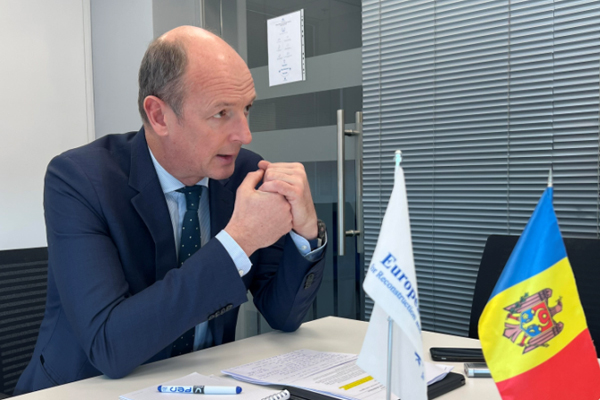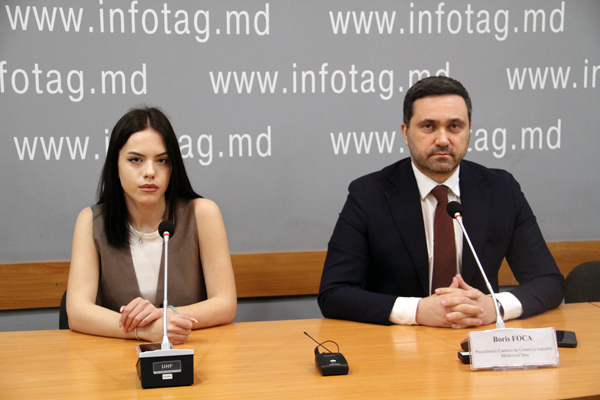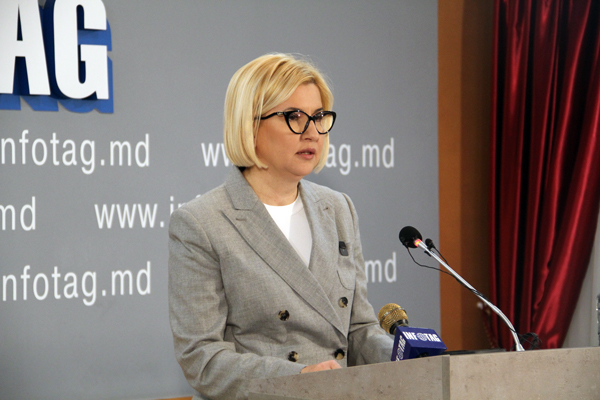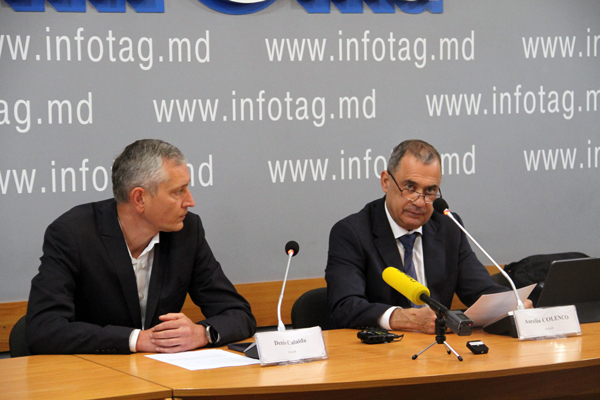Interview
MARK BOWMAN: EBRD ENCOURAGES MOLDOVA TO BE VERY AMBITIOUS IN TERMS OF PRODUCING RENEWABLES

Interview given to the INFOTAG news agency by EBRD Vice-President for Policy and Partnerships Mark Bowman, who visited Moldova on 27-30 March.
INFOTAG: Mr Bowman, you give us this interview on the last day of your visit to Moldova which took place soon after a visit by EBRD’s Managing Director for Eastern Europe and the Caucasus Matteo Patrone. What do these top-level visits speak about?
M.B.: First of all, I would like to say that I am very pleased to have the opportunity to visit Moldova.
At the EBRD, we are aware of the very serious situation Moldova has faced over the course of the last year given the Russian aggression against neighbouring Ukraine and the energy crisis that it entailed.
We are very happy that we have been able to provide support and play an important role in helping your country to navigate through these difficult times.
As you know, the EBRD provided an exceptional level of support to Moldova in 2022 - over 500 million euros of investment, including a 300-million-euro loan for the purchase of gas from Europe. That assistance was very important in terms of helping the country to prepare and get through the winter period.
I think that highlights the importance of Moldova to the EBRD at the moment.
INFOTAG: Could you please give us more details about the purpose of your visit and the meetings you had with government officials?
M.B.: One of the purposes of my visit was to appreciate the situation on the ground, to see and understand the challenges that the Moldovan government is facing. As I have already said, the EBRD is very keen to support the government with reform efforts, to move from the emergency period where we provided emergency support to helping the economy to become more resilient. With the government officials, we had very detailed conversations about how we can continue to support Moldova to become more energy resilient, which is a very key priority for the country.
We also discussed with the authorities the five-year country strategy for Moldova which the EBRD board has recently agreed.
INFOTAG: What are the key priorities of this new strategy?
M.B.: The strategy’s priorities are strengthening energy resilience and security and promoting a greener economy, supporting competitive and inclusive private sector development, more resilient financial infrastructure and improved governance and improving inclusive infrastructure delivery to support growth and enhance connectivity and trade
Now that the winter is over and the multiple crises of 2022 are beginning to recede, the government has a chance to move from crisis management to a more considered approach to longer-term development. Our Country Strategy is our blueprint to show the most important areas where we can offer Moldova longer-term support.
We’ve had positive feedback about the strategy’s usefulness from across the government and believe it will be effective in supporting the economy as it weathers the current turbulence before, as we forecast, returning to growth next year.
INFOTAG: Could you please give us more details about the support that the EBRD could provide when it comes to energy resilience?
M.B.: In terms of energy resilience, there are two things to mention.
First of all, this is the 300 million-euro loan that we provided last year to support Moldova with gas purchase. It helped the country to deal with the energy crisis and live through a difficult winter. Now it is important to have a strategy and to start preparing earlier for the next winter, taking advantage of the prices that are usually lower during the summer period, to buy more gas and to store it rather than buy gas later when things might be more difficult.
Second, it is very important that Moldova reduces its dependence on gas and starts exploring alternative sources of energy.
We know that there is significant potential for developing renewable energy here and that there is interest from investors. Therefore, we are very keen to encourage the government and work with it on developing the regulatory framework and all the different components that need to be put in place to increase the production of alternative sources of energy.
It is also very important for Moldova to create conditions for strong and sustainable growth and the EBRD is ready to support the government to reduce barriers, improve the investment climate, and deal with long-standing issues such as the reform of the judicial system. This will create conditions for the private sector to develop and flourish and attract more foreign investment.
INFOTAG: Thanks to the EBRD's 300m-euro loan, Moldova, for the first time ever, has not been consuming Russian gas for four months already, buying gas on the European market. Given today's regional circumstances, what should be Moldova's relations with Gazprom, which was Moldova’s only gas supplier until 2022?
M.B.: It is critically important for Moldova to reduce its dependence on a single gas supplier, to diversify and procure gas from European markets. One thing that Moldova and many other countries have learnt over the course of the last 12 months is that reliance on one single source of fossil fuel is not good. Fossil fuels are not only a dirty source of energy, but they are insecure and expensive. So, diversification is extremely important and a critical point at this moment in Moldova's history.
INFOTAG: In March, the EBRD agreed to lend $30 million to Moldova’s company Premier Energy Distribution to modernise and digitalise the electricity grid in the centre and south of the country, including Chisinau. Some experts say that this may lead to a new increase in the energy rate. Are these concerns justified?
M.B.: I think that investment in the energy sector is extremely important. If Moldova is to be successful in terms of diversifying energy sources, increasing energy security in the future and bringing renewables into the grids, then investment in grids is absolutely critical and is a key part of any strategy for diversity and energy security. Ultimately, investment into the grids will lead to cheaper electricity.
INFOTAG: Speaking about renewables, it is no secret that building all the necessary infrastructure, turbines, solar panels etc, requires huge investments. Is Moldova able to make these investments and when could it have at least 20% or 30% of the electricity it needs from renewables?
M.B.: I would not give any specific figures but I would encourage Moldova to be very ambitious in terms of producing renewables. I think your country has very significant potential. And you are right that renewables require significant investment but, once you made that investment, it is actually a very cheap, more secure and cleaner source of energy.
This is what stimulates the production of renewable energy in any particular country.
In addition, you need a regulatory climate where investors are prepared to make upfront investment in return for streams of revenues over many, many years. So, they require that certainty.
To be successful, it is necessary to have a comprehensive approach - having the conditions when investments can happen, having a regulatory framework which provides certainty and having grids capable of balancing the renewable energy because the wind does not blow 24 hours a day.
My fundamental point would be to encourage the Moldovan authorities to be ambitious in their renewable strategy.
INFOTAG: During the visit, you have also met representatives of the Moldovan banks, civil society organisations and Chisinau-based investment partners. What issues did you discuss with them? Did they put forward any recommendations or maybe they complained about something?
M.B.: I had very good discussions with civil society organisations which have been very much engaged in the preparation of the country strategy for the next five years. We value our relationship with the Moldovan civil society very much.
In terms of the messages and issues that we discussed, I think that civil society is very supportive of the government's reform direction. Yet, one issue that it raised with us was the importance of predictability in legislation and predictability of changes.
So, while there is a great deal of support for reforms and for the progress that the government is making in terms of aligning legislation with the EU laws and rules, it is also important to do that in a kind of systematic and predictable way, with full consultations with the civil society and the private sector.
Representatives of the civil society spoke about the importance of having a stable, transparent and predictable legal system and an investment climate that gives confidence to private sector investors to invest in this country.
INFOTAG: Since May 2021, the EBRD has been the sole owner of Danube Logistics SRL, the operator of the Giurgiulesti International Free Port in southern Moldova. How pleased is the bank with the activities of the port whose importance increased significantly since the start of the war? There has been a conflict of interests in Danube Logistics. Has it been solved?
M.B.: There is a long and complex history with this port. The EBRD's objective is to ensure that Moldova maximizes the benefits that it gets from this strategic asset but also, as an investor, to protect our financial interests.
We think that developments over the course of the last year have been positive. We have been working with the government which has set up a working group to discuss the possibilities of a strategic investor to come in and we are very keen to encourage that. We think that this is an important asset. It has a significant potential and, as you say, it is very important in terms of the Moldovan economy and trade. It is also important as a route that facilitates trade between Ukraine and the rest of the world.
Today the port is operating at a higher capacity than it did in the previous years and this is good news. This does not mean that there is no future potential for the port. But that would require a strategic investor to come in and develop the port to its full capacity.
INFOTAG: How do you assess the development of the Moldovan banks in which the EBRD is a shareholder?
M.B.: We are pleased with the role we have been able to play in the recent years, helping to clean up the Moldovan banking system of the legacy of non-transparent shareholders and to improve the governance structure. That is not to say that there is no more work still to be done. There are still some legacy issues in the case of Victoriabank, for example, and we are very keen to see them solved. But there has been good progress so far and it is important that the banks have been able to perform relatively strongly despite the difficult economic circumstances.
INFOTAG: Recently, Chisinau international airport has become state property again. Yet, over the years, the state has had the reputation of not a very good manager. In your opinion, what would be the best option for the airport now - to remain state property or maybe the government should attract a reputable foreign investor to run it?
M.B.: I will give you a general answer to this question. I talked earlier about the importance of creating an environment where you can have strong private sector growth and a flourishing economy. I think that reducing the role of the government in the economy and reducing the prevalence of the state-owned enterprises is important. There is no obvious reason why the government needs to be involved in so many different areas of the economy. It might be better to leave the private sector to take over those areas.
I think it is important for the government to have a clear strategy in terms of how it wants to take forward and reform the state-owned enterprises. At the EBRD, we have significant experience in terms of helping countries to reform their state-owned enterprises, to improve their governance and ultimately to support privatization if that is the decision that they make.
























Add Comment